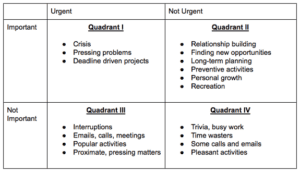Avoid these self-destructive traits to keep your business on track.
(Reading time: 5 minutes)
In the world of small and mid-sized businesses, there’s a leadership type that emerges with unfortunate regularity: the dysfunctional, self-destructive owner-manager. I’ve come across them more times than I’d like to admit. From profanity-laced Zoom calls to no-show meetings and snarling tirades at staff, these characters leave a trail of chaos in their wake.
This phenomenon is more common than you might think and can affect more than relationships with employees, customers, and suppliers; it can have a long-term negative impact on the overall value of your company. If you recognize any of these traits, it might be time to consider some executive coaching.
Urgent vs. important: the Covey matrix
 I’ve written before about Stephen Covey’s classic four-quadrant matrix, which is useful here. Covey advises focusing on tasks that are important but not urgent—the systems, structures, and strategies that prevent problems before they happen. But dysfunctional owner-managers live in the opposite quadrant: the urgent and unimportant, or worse, the urgent and important created by their own neglect.
I’ve written before about Stephen Covey’s classic four-quadrant matrix, which is useful here. Covey advises focusing on tasks that are important but not urgent—the systems, structures, and strategies that prevent problems before they happen. But dysfunctional owner-managers live in the opposite quadrant: the urgent and unimportant, or worse, the urgent and important created by their own neglect.
They lurch from crisis to crisis, patching leaks instead of fixing the boat. Technician didn’t show up? Scramble to cover it. Financial report late? Blame the bookkeeper. Staff morale down? Fire someone and announce that firings will continue until morale improves! It’s a reactive, exhausting way to run a business, and it guarantees long hours and low returns.
Five classic signs of a dysfunctional owner-manager
Shiny object syndrome
- Do you think of strategy as whatever pops into your boss-head when your feet hit the floor in the morning? Is yesterday’s initiative forgotten by lunchtime?
One week, the company’s a generator distributor; next month it’s pivoting to batteries because someone read a magazine article. Without long-term planning and thoughtful market positioning, these initiatives are not innovations, but a series of ill-considered lurches toward whatever seems shiny and new that frustrates your employees and confuses your customers or clients.
- Poor choice of advisors
Have you surrounded yourself with the right people?
 Are you relying mostly on old friends, golfing buddies, or legacy accountants and lawyers long out of their depth? What about benefit brokers who pocket commissions without offering strategic advice? Make sure you’re not operating in an echo chamber following unqualified or outdated advice.
Are you relying mostly on old friends, golfing buddies, or legacy accountants and lawyers long out of their depth? What about benefit brokers who pocket commissions without offering strategic advice? Make sure you’re not operating in an echo chamber following unqualified or outdated advice.
When was the last time that somebody challenged you, offered a different opinion, or shared a new way of thinking? This is a good check that should tell you if you’re relying on the same old, same old, or if you’re getting actionable, relevant, and thoughtful advice.
- Lack of business etiquette and courtesy
Business etiquette isn’t about saying “please” and “thank you”—though that helps. It’s about operational efficiency and professional respect. Basic courtesies like giving credit where it’s due, responding to communications promptly, and not taking credit for others’ work are key pieces of a good company culture.
Otherwise, you risk stalling decision-making pipelines and losing good employees.
- Disorganized, haphazard employee management
Do you have systems in place that govern job descriptions, salary bands, performance reviews, and clear chains of authority? Or does your approach to compensation reward whim and negotiation prowess over role value or performance.
An atmosphere where responsibilities are blurred and expectations are fuzzy fosters resentment, turnover, and inefficiency — and it’s a silent killer of morale and productivity.
5. Reactive, not proactive operations
Is your company entirely dependent on you…to the point where nothing can proceed without your sign off? Be wary of this—as I have written elsewhere, companies that are too tied to their owners can be difficult to scale or sell at a good price. In these cases, owners end up burnt out, chained to their business, bailing water as fast as they can.
What next?
Does any of this sound familiar? You’re not alone.
You probably started out with a skill that you successfully commercialized, but it’s important to recognize that what worked in a company with $500,000 in revenue won’t work at one with $8 million.
 The sooner you recognize these challenges and find ways to deal with them the better. This could mean engaging an effective, independent consultant to help you set up some systems and controls. Or maybe you need to hire a senior manager to oversee your operations. It could mean taking some courses and rounding out your skills.
The sooner you recognize these challenges and find ways to deal with them the better. This could mean engaging an effective, independent consultant to help you set up some systems and controls. Or maybe you need to hire a senior manager to oversee your operations. It could mean taking some courses and rounding out your skills.
Just remember that more often than not, the key to a successful business isn’t necessarily a product or service, but the leadership and the culture that produce them.
Larry Smith is the founder and president of Kathbern Management, an executive search firm based in Toronto. Kathbern helps companies find the executives and senior managers who not only have the experience and credentials to fulfill their responsibilities, but also have the emotional and “fit” requirements that will enable them to be successful in a particular environment. Kathbern simplifies the process and, through deep research, brings more and better candidates forward than would ever be possible through a do-it-yourself passive advertising campaign.
Learn more at www.kathbern.com, or contact us today for a free consultation about your key person search. Follow us on LinkedIn, Facebook, and Twitter.

